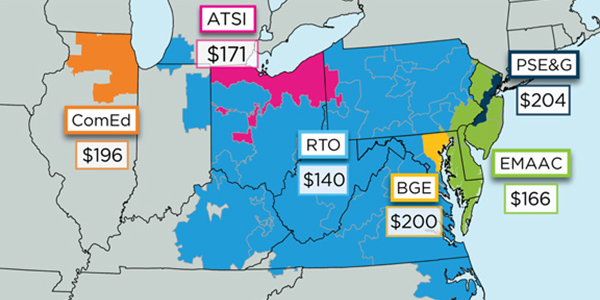PJM’s Independent Market Monitor has opened another front in its bid to strengthen the RTO’s market power rules, filing challenges to the renewals of market-based rate authorizations (MBRAs) in 14 dockets.
The Monitor said the RTO’s current market power mitigation rules are insufficient to support the reauthorizations, reiterating arguments it made in its State of the Market reports for PJM and its February 2019 complaint alleging that the capacity market seller offer cap (MSOC) allows market power by some sellers (EL19-47).
Barring new rules, the Monitor said, FERC should require capacity market sellers to offer their resources at or below the “competitive capacity offer” — currently the avoidable-cost rate adjusted for expected Capacity Performance (CP) penalties and bonuses.
Energy market offers should be capped at or below the defined cost-based offer and required to submit operating parameters at least as flexible as the market’s defined unit-specific parameter limits, the Monitor said.
The Monitor filed protests Aug. 28 and 31 challenging triennial MBRA renewal requests by:
- Calpine Bethlehem, et al. (ER10-2051);
- Wheelabrator Baltimore, et al. (ER13-1485);
- TAQA Gen X, Red Oak Power and Bayonne Energy Center (ER15-289);
- LQA, Tenaska Power Services, et al. (ER16-733);
- Cube Yadkin (ER16-2278);
- Macquarie Energy (ER18-2264);
- Moxie Freedom (ER20-2276);
- Longview Power (ER10-1556);
- NRG Power Marketing, et al. (ER10-2265);
- Commonwealth Chesapeake and Hickory Run Energy (ER10-3078, ER19-2564);
- Talen Energy Marketing, et al. (ER15-2013);
- Radford’s Run, et al. (ER17-1438);
- Carrol County Energy (ER17-1609); and
- Kestrel Acquisition (ER18-1106)
The Monitor noted that Order 861 allows intervenors to challenge MBRA applicants’ claims that they do not post horizontal market power concerns. “Analysis of PJM markets shows that all PJM sellers have the potential to have and exercise local market power at any time based on transmission constraints that may arise in the PJM market for a variety of reasons,” it wrote.
While PJM’s energy market results are “generally competitive,” the Monitor said, market power mitigation is often inadequate.
“Some sellers that fail the structural market power test — the three-pivotal-supplier test (TPS) — are able to set prices with a substantial markup over their cost-based offer,” it said. “Some sellers that fail the TPS test are able to operate, set prices and collect uplift payments with operating parameters that are less flexible than their defined parameter limits.”
No Action
FERC has not responded to the Monitor’s complaint over the MSOC, and there has been no substantive action in the docket since May 2019, when the IMM responded to PJM’s request to dismiss it.
PJM said the Monitor had failed to provide evidence that the cap — approved four years prior as part of the CP construct — and the results of Base Residual Auctions (BRAs) suddenly became unjust and unreasonable. (See PJM: Dismiss Monitor’s Offer Cap Complaint.)
The RTO said the commission’s order approving CP “explained that the default MSOC is just and reasonable because it reflects the amount that a competitive resource would accept to be committed as a capacity resource.”
The Monitor contends that ratepayers were overcharged by $2.7 billion (41.5%) in the 2018 BRA because of economic withholding encouraged by an inflated MSOC. “The assertion that the system conditions have not ‘drastically changed’ since 2015 has no basis in fact and would surprise any objective observer of PJM markets,” it wrote in its answer. (See Monitor Defends Offer Cap Complaint.)





